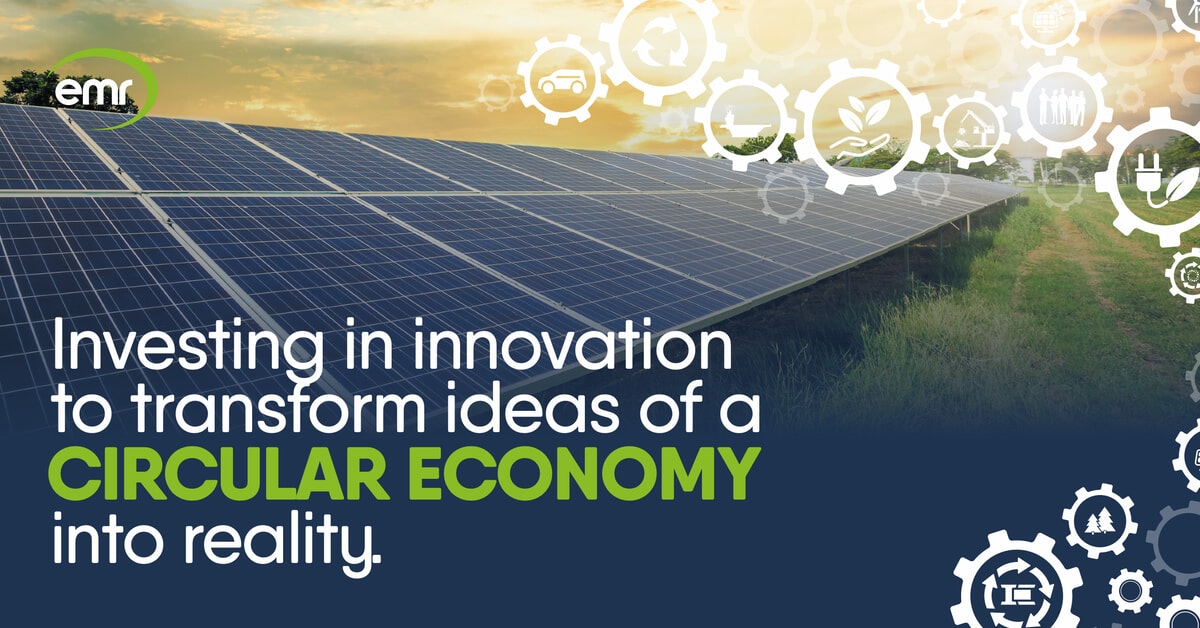CHOOSE
A DIFFERENT TERRITORY

With the arrival of this year’s Circular Economy Week, EMR’s Managing Director for Technology and Innovation, Roger Morton, explains why this important concept underpins so much of the company’s innovation.
What is the simplest way to make our economy more sustainable?
Through reuse and recycling, it is possible to extend the lifecycle of essential materials and give them a second, third – or even tenth or eleventh – useful life.
As a world-leading supplier of recycled materials, EMR has multiple teams who are all working hard to create a circular economy like this for steel, non-ferrous metals, batteries, rare-earth magnets, plastics, and other essential components in the products we use every day.
And circular supply chains don’t just provide sustainability benefits, they are also much more efficient.
Yet, while the logic of the circular economy is relatively simple, delivering a world where resources are recycled and reused multiple times requires a huge amount of investment and innovation.
Take the steel industry: the UK consumes approximately 12 million tonnes of semi-finished steel and produces around 11 million tonnes of steel scrap annually. Surely, this means UK steelmakers only require enough virgin iron ore to make 1 million tonnes of new steel each year?
Unfortunately, the UK is only now starting to invest in the technology required to handle the quantity of recycled steel it produces, and, at present, much of this material must still be exported, with millions of tonnes of virgin iron ore imported in its place.
As we mark the arrival of the sixth annual Circular Economy week, I’m proud to say that EMR is helping to make the investments required to change this.
A great example is RECTIFI, a project that promises to reduce CO2 emissions by almost 5 million tonnes per year by creating new high-quality grades of recycled steel that will allow steelmakers to increase the recycled content of their products and developing a sustainable alternative to clinker for the cement industry.
RECTIFI is a partnership between EMR, TATA Steel, Aggregate Industries, Darlow Lloyd & Sons, and the University of Swansea, with funding support from the UK Government via Innovate UK’s Transforming Foundation Industries programme.
The steel and cement industries are responsible for almost a fifth of global carbon emissions (11%* and 7%**, respectively) and bringing firms together at different points in the lifecycle of these materials will be crucial as we develop an efficient circular economy.
And that’s not all.
EMR has also led the way with the emerging market for Reusable Steel. By carefully selecting and extracting the highest-quality steel beams from end-of-life buildings, EMR has created a circular supply chain that removes the need for carbon intensive remelting, long-distance transportation, and the use of nature-depleting iron ore. This offers construction firms a 97.5% carbon saving compared with typical steel products and comes with the added benefit of the world’s first EPD (Environmental Product Declaration) for a reusable steel product.
Creating transformative circular economies is driving investment and innovation across EMR’s business.
Another exciting project, RECOVAS, is developing a circular supply chain for electric vehicle batteries. By triaging these advanced batteries for remanufacturing, reuse or recycling, this new supply chain will ensure they can be reused – by the automotive or energy industries – wherever possible, with recycling offering a way to safeguard the valuable metals they contain, when the first two options aren’t possible.
Supply chains like this require cooperation with companies at every level and the consortium behind RECOVAS includes Jaguar Land Rover, BMW, Bentley, Autocraft Solutions, Connected Energy, UKBIC (UK Battery Innovation Centre), and the University of Warwick – alongside EMR. The work of RECOVAS is part funded by the Government’s Advanced Propulsion Centre.
MBA Polymers UK, EMR’s plastics recycling division, is meanwhile delivering new, high-specification recycled polymers – including a new recycled ABS (Acrylonitrile Butadiene Styrene) – which takes plastics from end-of-life vehicles and processes them to a standard which can be used once again by the automotive industry.
At EMR we are establishing science-based targets on the road to our net-zero emissions target and we believe that creating new circular supply chains like these is one of the best ways to achieve our goal. And advances like those happening across our business are only possible because of EMR’s track record of investing profit back into its business.
The logic of creating a sustainable circular economy in industries like ours may be relatively simple but, at EMR, we’re working hard to turn this simple idea into a workable reality.
* globalefficiencyintel.com/new-blog/2021/global-steel-industrys-ghg-emissions